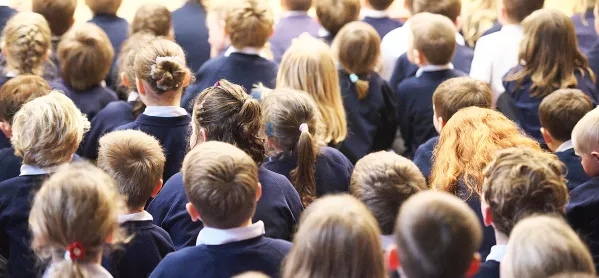- Home
- MAT faces High Court battle over Christian assemblies
MAT faces High Court battle over Christian assemblies

Parents are taking a large Church of England multi-academy trust to the High Court over the way it runs Christian worship at a school with no religious character.
Lee and Lizanne Harris’ case will claim that failing to provide their children with an alternative inclusive assembly at their primary school is breaching their human rights.
The parents say that when they withdrew their children from Christian worship they were left in a room with an iPad and a teaching assistant.
Faith: Hinds calls on more religious schools to become academies
Quick read: ‘More faith schools will promote division’
Background: Academics call for an end to hymns and prayers
The Harrises say they objected to their children being made to take part in Christian prayers and watch re-enactments of Bible stories at Burford Primary School in Oxfordshire.
The school has no religious character but became part of the Oxford Diocesan Schools Trust (ODST) in 2015 when it became an academy.
The couple said: “We enrolled our children into a state community school - which is meant to have no religious character - but over time we noticed harmful aspects of evangelism spreading into assembly and other parts of the school which goes against our children’s rights to receive an education free from religious interference.”
The Harris v Oxford Diocesan Schools Trust case, which will be heard on 29 November this year, is the first case on school worship to reach the High Court.
The parents are being supported by Humanists UK, which wants the requirement for collective worship to be repealed.
The organisation says it should be replaced by a “requirement for inclusive assemblies, which forward the spiritual, moral, social and cultural development of all pupils.”
A statement from ODST said it was “confident that Burford Primary School, as a community school, has acted entirely appropriately, and has followed all statutory requirements.”
State schools are required by law to provide an act of daily worship which should be “of a broadly Christian character”.
However, schools can apply for an exemption to this requirement and sixth-form pupils and parents can withdraw from compulsory collective worship within their school.
The Harris case wants to ensure schools have to provide a meaningful alternative to collective worship that is of “equal educational worth”.
They claim that a lack of an alternative assembly breaches the Human Rights Act over the rights to freedom of belief of parents and pupils.
In their submission to court, the parents also express concerns about “Christian indoctrination” in other aspects of the school including the leavers’ ceremony, which is held in a church and at which all leaving students receive a Bible as a gift.
The couple said: “When our children go to school they shouldn’t have to participate in Christian prayers, or watch biblical scenes such as the Crucifixion being acted out. Nor should they have to hear from evangelical preachers who spout harmful and often divisive messages.”
“We also don’t think it’s acceptable that they be left to play with an iPad because we’ve withdrawn them. They should be able to participate in an inclusive assembly that is of equal educational worth and which is welcoming and respectful of all students, no matter their background.”
Humanists UK’s chief executive Andrew Copson said: “Our state schools are home to children of a broad diversity of cultures and backgrounds and they deserve and need inclusive activities that bring them together as one community.
“Requiring children to participate in religious worship, and then marginalising them if in good conscience they cannot, ignores their right to freedom of religion or belief and is a negation of inclusion.”
A statement from ODST said: “Collective worship, which is a statutory requirement in all church and community schools, is aimed at encouraging pupils to develop a sense of mystery, awe and wonder about the world.
“This is all done through listening to stories from a wide range of different cultures and religions, giving time for children to think about themselves, and the contribution they all make to our society.
“Collective worship also gives our children the opportunity to celebrate achievement and special occasions.”
The trust runs 33 church and community schools across Oxfordshire and Berkshire.
ODST also highlighted the findings of Burford Primary’s most recent Ofsted inspection last year, which found that “pupils speak with confidence about different faiths and cultures”.
Inspectors also said pupils had a keen sense of equalities and their work demonstrates a “deep understanding of British values”.
Keep reading for just £1 per month
You've reached your limit of free articles this month. Subscribe for £1 per month for three months and get:
- Unlimited access to all Tes magazine content
- Exclusive subscriber-only stories
- Award-winning email newsletters



